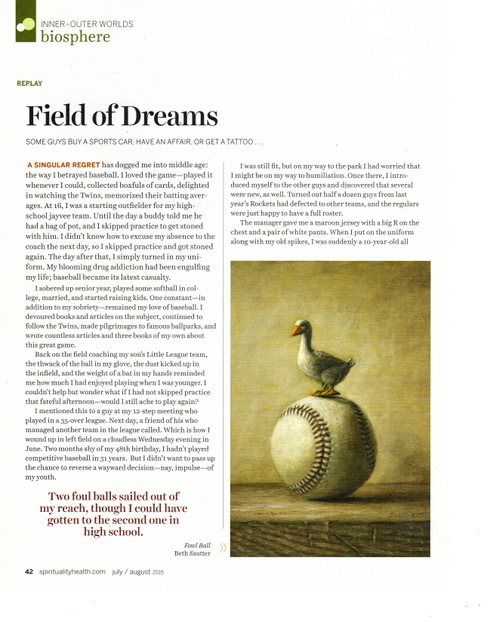A singular regret has dogged me into middle age: the way I betrayed baseball. I loved the game–played it whenever I could, collected boxfuls of cards, delighted in watching the Twins, memorized their batting averages. At 16, I was a starting outfielder for my high school jayvee team. Until the day a buddy told me he had a bag of pot, and I skipped practice to get stoned with him. I didn’t know how to excuse my absence to the coach the next day, so I skipped practice and got stoned again. The day after that I simply turned in my uniform. My blooming drug addiction had been engulfing my life; baseball became its latest casualty.
I sobered up senior year, played some softball in college, married and started raising kids. One constant–in addition to my sobriety–remained my love of baseball. I devoured books and articles on the subject, continued to follow the Twins, made pilgrimages to famous ballparks and wrote countless articles and three books of my own about this great game.
Back on the field coaching my son’s Little League team, the thwack of the ball in my glove, the dust kicked up in the infield and the weight of a bat in my hands reminded me how much I had enjoyed playing myself. I couldn’t help but wonder what if I had not skipped practice that fateful afternoon–would I still ache to play again?
I mentioned this to a guy at my 12-Step meeting who played in a 35-over league. Next day, a friend of his who managed another team in the league called. Which is how I wound up in left field on a cloudless Wednesday evening in June. Two months shy of my 48th birthday, I hadn’t played competitive baseball in 31 years. But I didn’t want to pass up the chance to reverse a wayward decision–nay, impulse–of my youth.
I was still fit, but on my way to the park I had worried that I might be on my way to humiliation. Once there, I introduced myself to the other guys and discovered that several were new as well, including a Jim Leyland doppelganger who could still snap a curveball, and Adam, a pigeon-toed shortstop who had answered a newspaper ad. Turned out half a dozen guys from last year’s Rockets had defected to other teams, and the regulars were just happy to have a full roster.
The manager gave me a maroon jersey with a big R on the chest and a pair of white pants. When I put on the uniform along with my old spikes, I was suddenly ten years old all over, pretending to be Harmon Killebrew. Jogging out to left field, I couldn’t believe I was getting the chance to play baseball again after so many years.
The game was harder to play than I remembered. In the first inning, I started back on a line drive but not nearly fast enough, and the ball soared over my head all the way to the the 340-foot sign. Two foul balls sailed out of my reach, though I could have gotten to the second one in high school. In the third inning I took off for a shot to left-center. I seemed to have it lined up correctly. I can catch this, I thought excitedly and shoved my glove high to snag the drive–but felt only emptiness. The ball whizzed past. Damnit. I cut sharply to give chase and my right glute protested. I got the ball back to the infield–at least I hit the cutoff man–but the pain in my buttocks reminded me I was no longer a teenager.
Batting proved even more difficult. The first pitch that screamed past–Strike!–let me know this was leagues different from the tennis balls my ten-year-old threw me in the front yard. I popped up meekly in front of the plate.
In the bottom half of the final frame, I batted with two on, one out. I didn’t want to mess up in the midst of our last-chance rally. The count mounted to 3-2. Okay, I told myself like I told the kids I coached, protect the plate. I choked up. The pitch missed wide. I eventually scored on another walk. From the dugout, I watched our third baseman, a grandfather, ground out with the bases loaded to seal our loss.
I finished the night oh-for-three with a walk and a run scored. I handled five balls in the field, made one throwing error and suffered a slight muscle pull that promised to be sore the next day. I counted the evening a personal victory.
How often in middle age do we get the chance for a do-over on a regret from our youth? I carried home the memory of standing in the outfield grass under the blue sky, tickled by joy, and thinking, “Thank you.
John Rosengren is the award-winning author of HANK GREENBERG: The Hero of Heroes and THE FIGHT OF THEIR LIVES: How Juan Marichal and John Roseboro Turned Baseball’s Ugliest Brawl into a Story of Forgiviness and Redemption.
© John Rosengren
